In the ever-changing digital landscape, technology has evolved from being a mere backbone of businesses to becoming the very lifeblood of modern organizations. In the past, its primary role was to support operations and enhance efficiency, while data acted as an auxiliary tool for managing customers and making informed decisions. Today, however, technology and data are no longer just support systems—they are the driving forces behind innovation, value creation, and strategic growth across virtually every aspect of a business. This paradigm shift highlights the critical importance of addressing digital transformation issues to unlock the full potential of technology while mitigating associated risks.
The Evolving Role of Cybersecurity
As technology advances and becomes the core of business operations, cybersecurity must transform in parallel. Economic challenges and a global push towards innovation have accelerated the adoption of generative AI, digital transformation, and increased connectivity. These shifts are not without risks. According to KPMG’s CEO Outlook, 72% of global CEOs express concerns about their long-term prosperity. Consequently, 64% of these leaders are committed to investing in advanced technologies like AI, regardless of economic uncertainty, to secure sustainable growth.
Chart Placeholder: A bar graph illustrating the percentage of CEOs focused on long-term prosperity (72%) and committed to AI investments (64%).
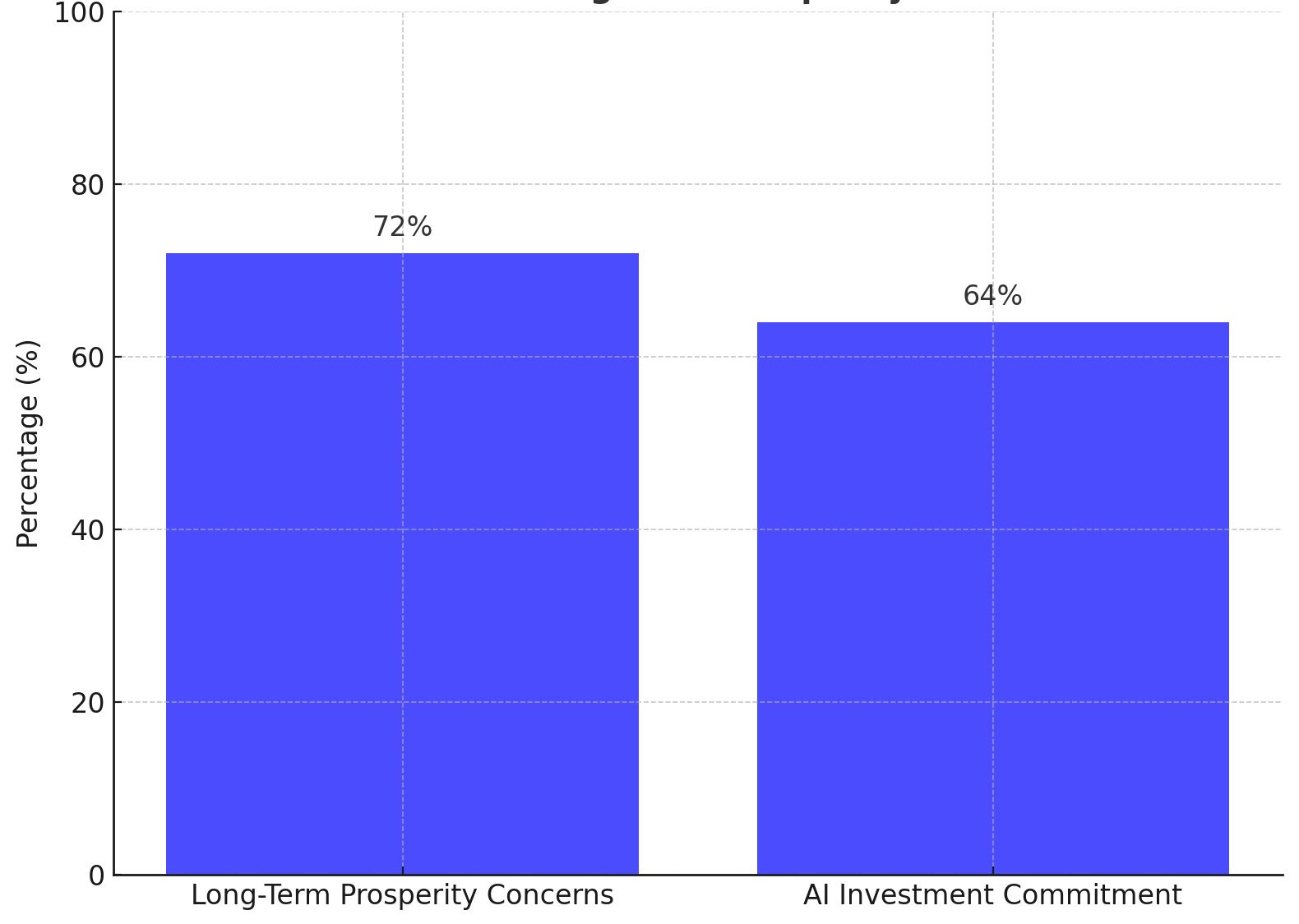
Cybersecurity as a Strategic Imperative
With businesses relying more heavily on digital infrastructures, cybersecurity must evolve from a reactive support role to a proactive and strategic cornerstone. Robust cybersecurity measures ensure operational continuity, protect intellectual property, and secure future growth opportunities. Furthermore, integrating advanced AI capabilities into these systems can unlock new levels of efficiency and resilience while safeguarding critical business assets. Financial services consulting companies are playing a pivotal role in helping organizations navigate these challenges and implement robust digital transformation strategies.
CEO’s Growing Awareness of Cybersecurity Risks
Unlike their predecessors, today’s CEOs have a closer connection to technology. Many have firsthand experiences with cyber incidents, ranging from personal email breaches to significant regulatory fines resulting from data mishandling. This heightened awareness is fostering greater action. According to the Global Tech Report, 73% of CEOs are increasing investments in cybersecurity to address the unique risks posed by AI-related threats.
Chart Placeholder: A pie chart or infographic showcasing the 73% of CEOs increasing cybersecurity budgets.
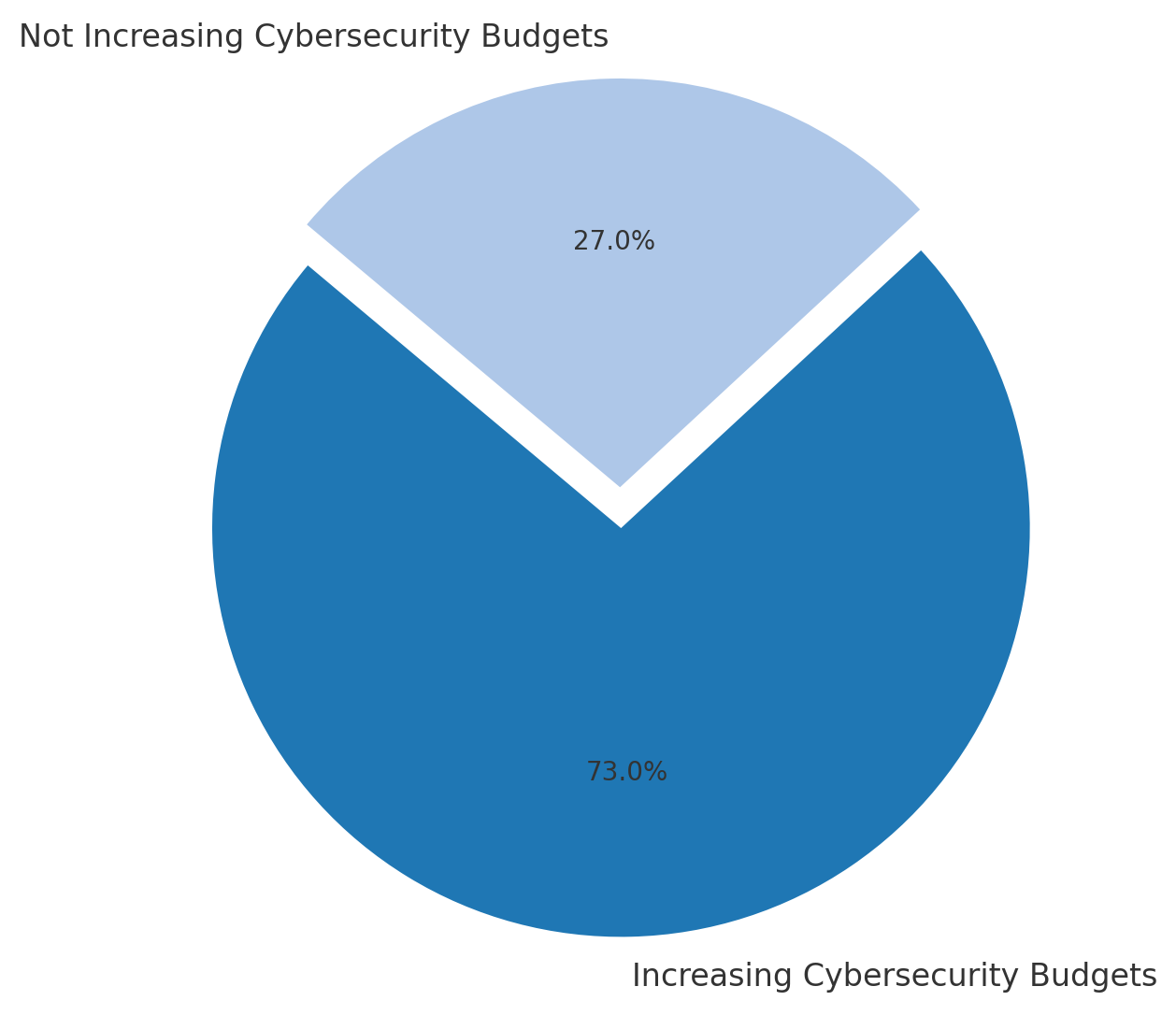
Balancing Technology Investments with Cybersecurity
The rapid adoption of AI and other digital technologies introduces unprecedented vulnerabilities. While nearly all CEOs plan to invest in AI, 80% recognize that cybercrime and digital insecurity will likely hinder their organization’s prosperity in the next three years. This realization creates a pressing need to strike a balance between embracing innovation and ensuring security.
Quantitative Insights
- AI Investment Priority: 90% of CEOs are actively incorporating AI into their business models.
- Cybercrime Concern: 80% foresee direct impacts of cyber threats on organizational growth.
Advanced technologies like generative AI require a nuanced approach to security. Integrating such tools often necessitates replacing outdated systems with AI-enabled security measures, ensuring cohesive and comprehensive protection across legacy and modern infrastructures.
Chart Placeholder: A line graph projecting the anticipated rise in cybercrime concerns over the next three years.
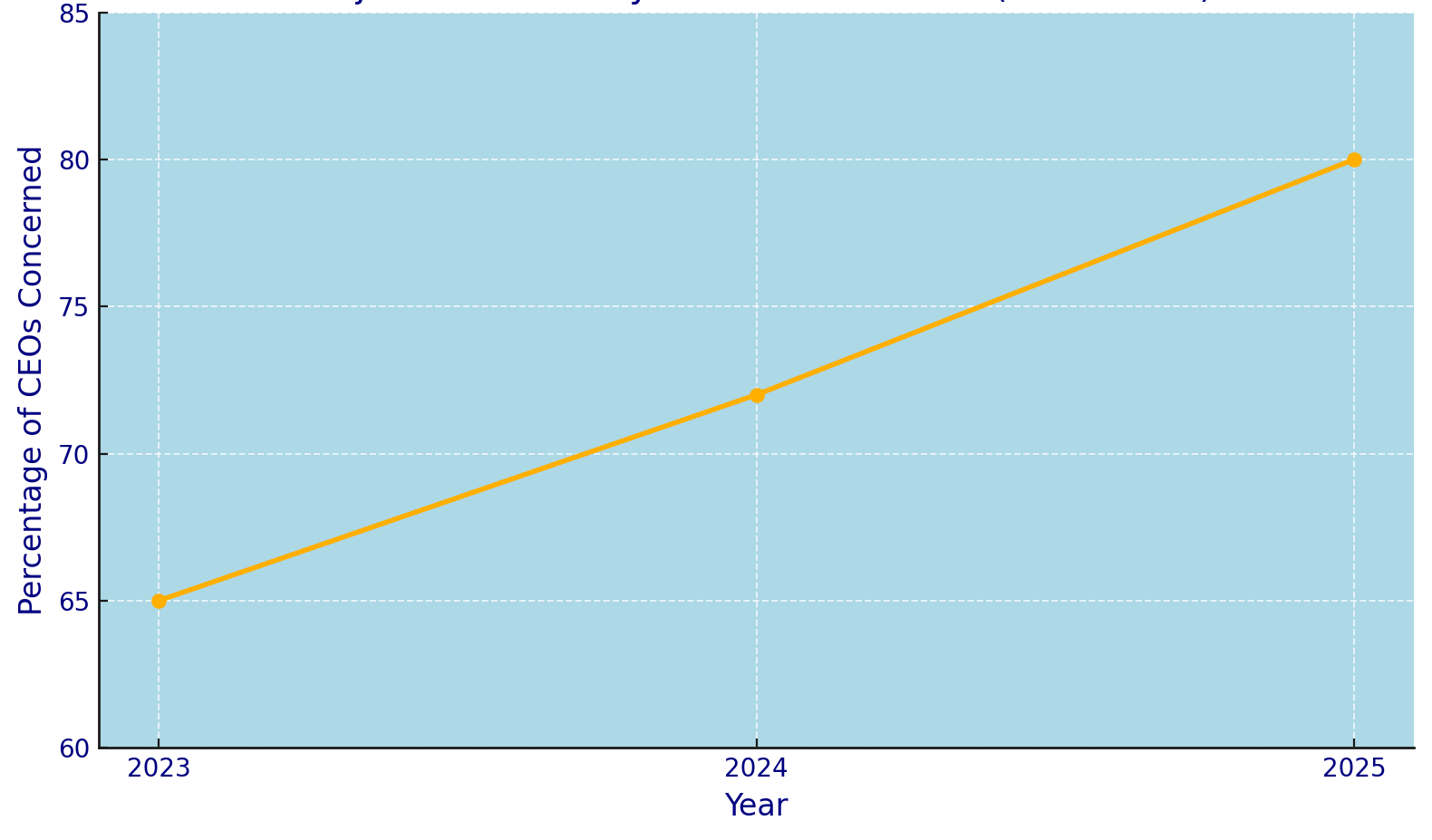
The Evolving Role of the CISO
The responsibilities of the Chief Information Security Officer (CISO) have expanded significantly. While early CISOs relied on basic tools like firewalls and antivirus systems, today’s CISOs must address complex and rapidly evolving threats. They play a crucial role in ensuring that companies can innovate securely without compromising on protection.
Key Responsibilities for Modern CISOs
- Risk Management: Assess and prioritize cyber risks, focusing on those that pose the greatest threats to business continuity.
- Investment Oversight: Strategically allocate cybersecurity budgets to maximize impact and address the most pressing vulnerabilities.
- Value Demonstration: Clearly communicate the ROI of cybersecurity investments through metrics like reduced regulatory fines or avoided operational disruptions.
- AI Utilization: Employ AI-driven tools to automate tasks such as threat detection, data analysis, and system healing, enhancing overall efficiency.
Building a Cyber-Resilient Culture
Organizations that embed cybersecurity into the early stages of digital transformation projects are better positioned to mitigate risks. Recent findings indicate that 72% of companies are adopting a secure-by-design approach, empowering cyber teams during the initial phases of technology investments. This proactive strategy minimizes disruptions and enables seamless innovation.
Cultivating a Cybersecurity-Driven Mindset
Embedding AI safely into business operations requires a cultural transformation. Approximately 74% of global CEOs agree that fostering a strong cybersecurity culture is essential for integrating AI effectively. Security must transcend IT departments, becoming a shared responsibility embedded within the organization’s DNA. From developers to executives, everyone must understand that security is as vital as innovation.
Financial Services and Cybersecurity Challenges
The financial services sector faces unique cybersecurity challenges due to its heavy reliance on sensitive customer data and real-time transaction systems. A recent survey highlighted that 48% of financial services firms see data privacy and regulatory compliance as the top priorities in cybersecurity investments. Financial services consulting companies are crucial partners in overcoming these hurdles and ensuring that digital transformation initiatives are secure and efficient.
Chart Placeholder: A comparative bar chart showcasing priorities such as data privacy, regulatory compliance, and fraud prevention.
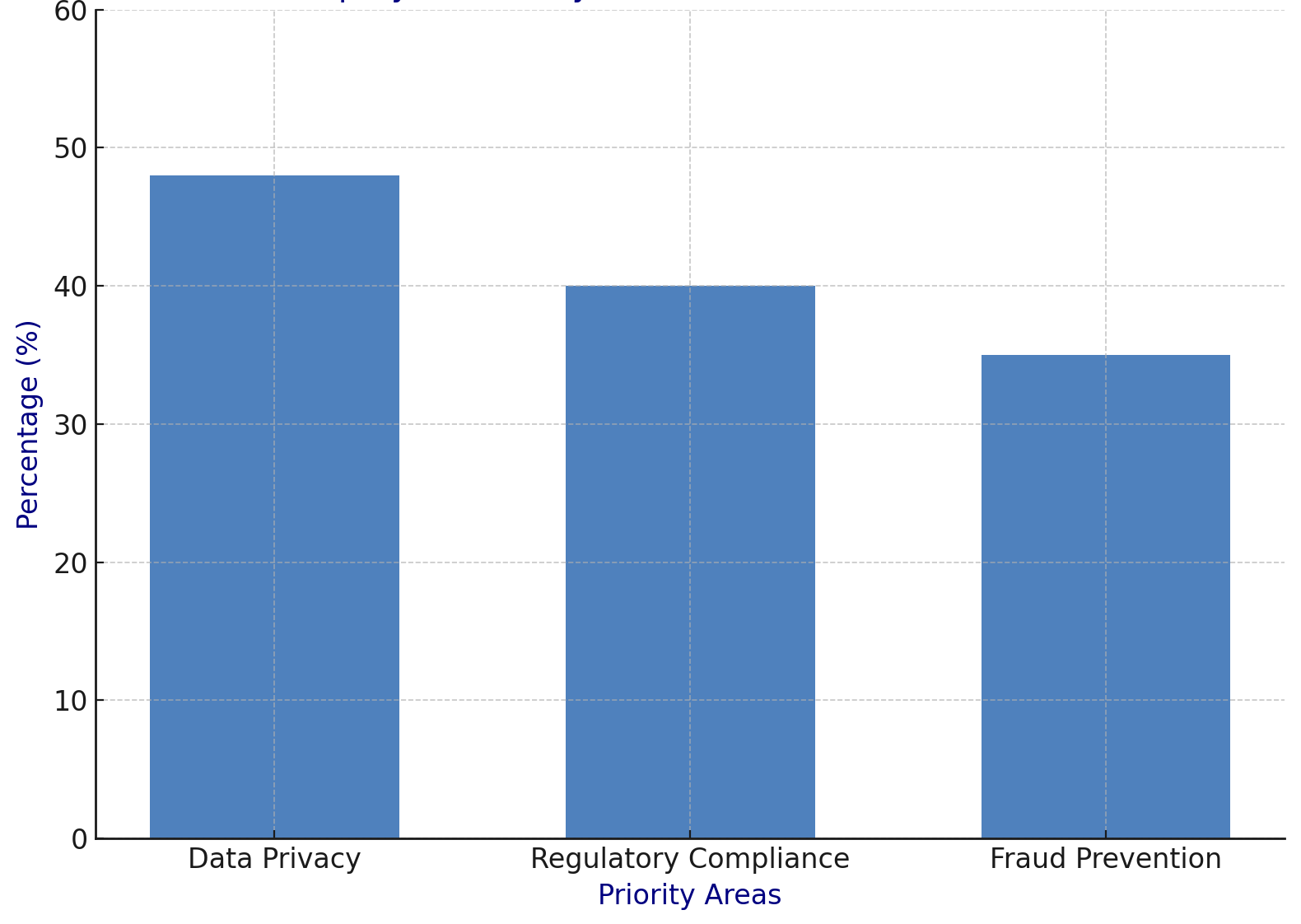
Quantifying Cyber Risks and ROI in Cybersecurity
Quantifying risks and demonstrating the return on investment (ROI) in cybersecurity remain critical for decision-making. A 2024 industry report revealed that organizations with proactive cybersecurity measures experienced 35% fewer operational disruptions and saved an average of $1.2 million annually in regulatory fines and reputational damages.
Global Perspectives: Insights from KSA and Beyond
Saudi Arabia’s focus on digital transformation has driven significant advancements in cybersecurity, with investments in AI-enabled security tools growing by 45% in 2024. Insights from KSA show that 68% of organizations prioritize secure digital transformation as a cornerstone of their strategic initiatives.
Chart Placeholder: A line graph tracking the growth of cybersecurity investments in Saudi Arabia from 2020 to 2025.
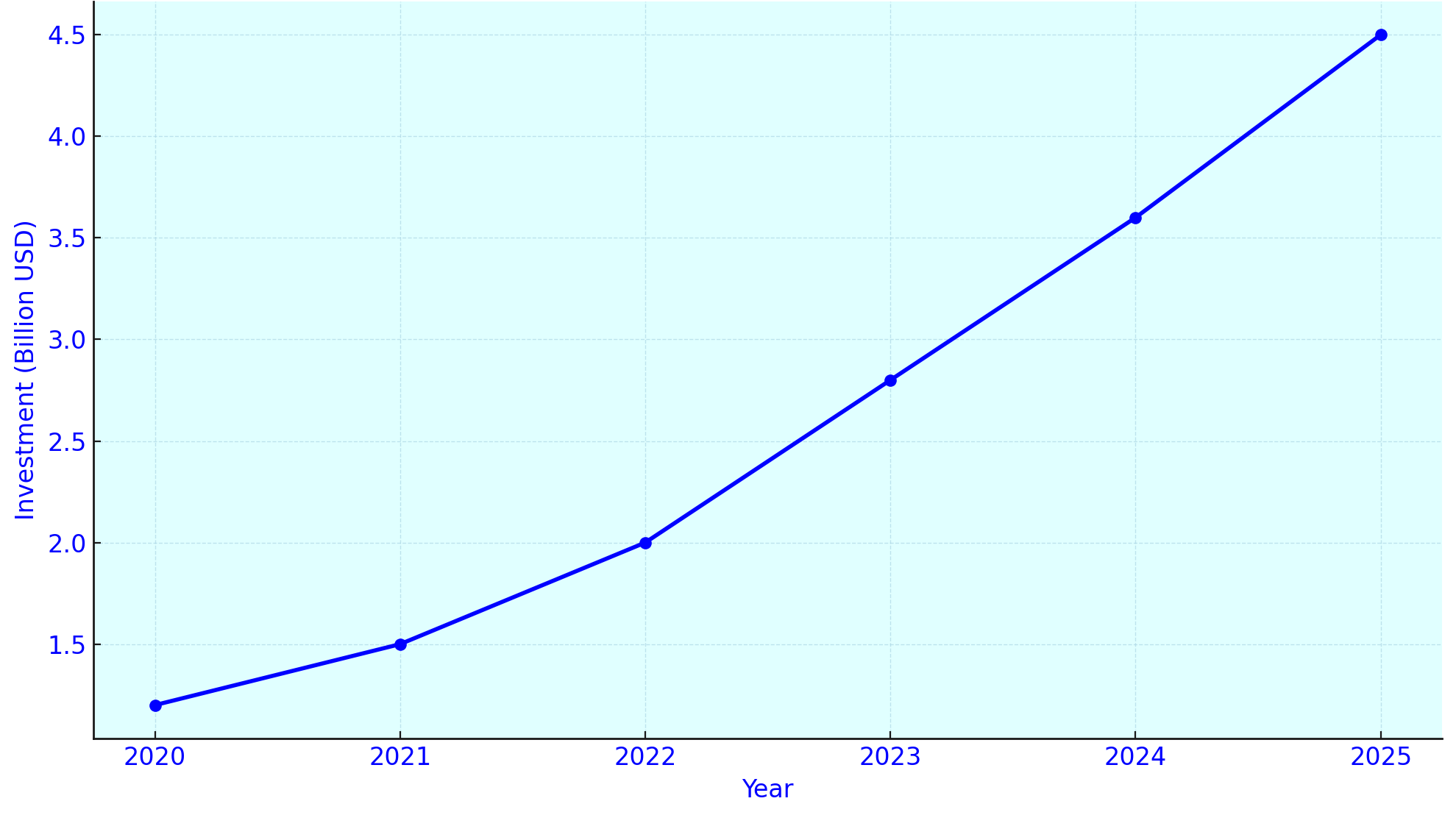
Regional Cybersecurity Challenges in Emerging Markets
Emerging markets face distinct cybersecurity challenges as they accelerate digital transformation efforts. In 2024, 54% of organizations in emerging economies reported significant budget constraints as a barrier to implementing robust cybersecurity measures. These regions also face talent shortages, with only 37% of surveyed firms able to recruit skilled cybersecurity professionals.
The Role of Collaboration in Cybersecurity
Collaborative efforts between public and private sectors are becoming vital for addressing global cybersecurity challenges. In 2025, joint initiatives in cybersecurity are expected to increase by 40%, focusing on sharing threat intelligence, standardizing regulations, and fostering innovation through partnerships.
How Does Insights KSA Help You?
Insights KSA offers a unique combination of local expertise and global perspectives, making it an invaluable partner for organizations navigating digital transformation issues. By focusing on tailored cybersecurity strategies, AI integration, and compliance with local and international regulations, Insights KSA ensures that businesses in the Kingdom of Saudi Arabia can thrive securely. Their services include:
- Customized Digital Transformation Solutions: Helping organizations identify and address specific digital transformation challenges.
- Comprehensive Cybersecurity Audits: Assessing vulnerabilities and implementing robust security measures.
- AI and Technology Consulting: Integrating advanced technologies while maintaining security and compliance.
- Training and Development: Building internal capacity to manage cybersecurity risks effectively.
FAQs
- What are the key digital transformation issues businesses face today? Businesses commonly struggle with legacy system integration, cybersecurity vulnerabilities, and a lack of skilled professionals to manage digital transitions effectively.
- How can financial services consulting companies support digital transformation? These companies offer expertise in integrating advanced technologies, ensuring compliance with regulatory frameworks, and implementing efficient cybersecurity measures tailored to the financial sector.
- Why is cybersecurity critical during digital transformation? Cybersecurity safeguards sensitive data, protects operational continuity, and ensures that new technologies like AI are integrated safely and effectively.
- How does Company Insights KSA differentiate itself? Insights KSA combines deep local market understanding with cutting-edge global practices, offering customized solutions that address both regional and international challenges.
- What industries benefit most from digital transformation strategies? While all industries can benefit, sectors such as financial services, healthcare, and manufacturing often see the most significant impact due to their reliance on data and advanced technologies.
In a world defined by rapid technological advancements, cybersecurity is no longer a supplementary function—it is a strategic enabler of growth and innovation. CEOs must prioritize secure practices, adopt cutting-edge tools, and cultivate a culture that values security as much as innovation. By addressing digital transformation issues and collaborating with financial services consulting companies like Insights KSA, businesses can mitigate risks, enhance resilience, and unlock the transformative potential of AI and other emerging technologies.
Source Links:
- https://kpmg.com/xx/en/our-insights/value-creation/kpmg-global-ceo-outlook-survey.html
- https://kpmg.com/xx/en/our-insights/ai-and-technology/kpmg-global-tech-report-2023.html
- https://www.pwc.com/gx/en/industries/financial-services/publications/financial-services-in-2025.html
- https://kpmg.com/sa/en/home/insights/2024/10/investing-in-cybersecurity-to-safeguard-innovation.html






